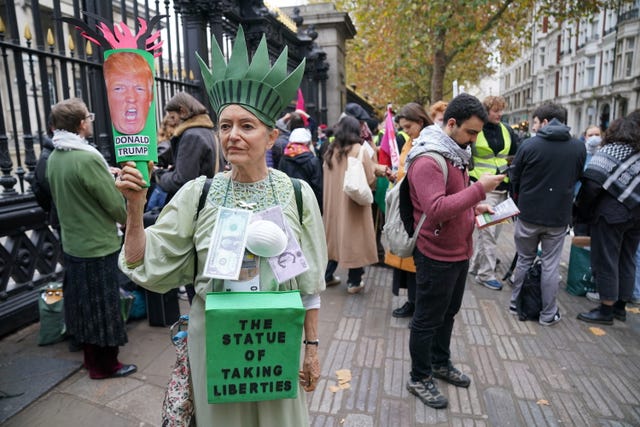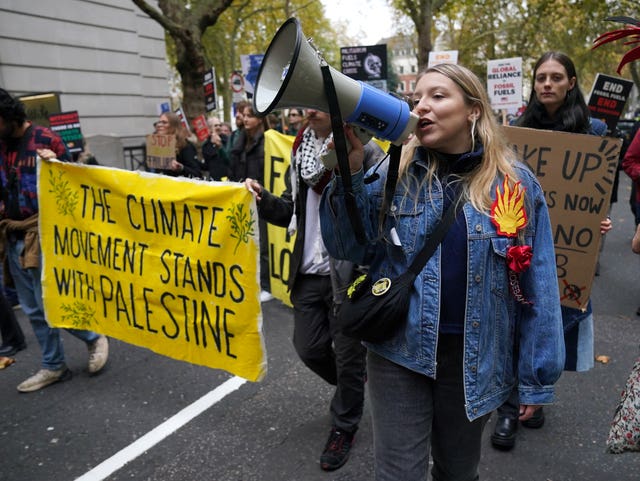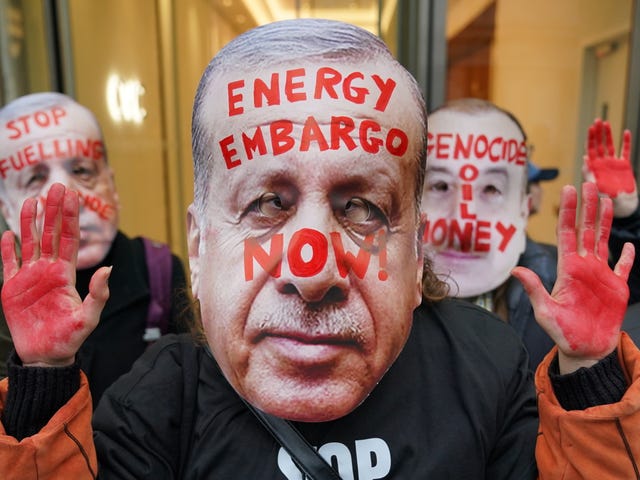Protesters have said the conflict in Gaza and the climate crisis are “inextricably linked” as around 1,000 demonstrators marched through central London.
The protest, involving more than 60 groups including Greenpeace, Extinction Rebellion, Amnesty International and the Palestine Solidarity Campaign, rallied outside the British Museum on Saturday before marching to Downing Street to demand an end to the UK’s reliance on fossil fuels and that the Government ends its “complicity in Israel’s escalating genocidal violence”.
It comes as world leaders have gathered for the UN’s Cop29 climate summit in oil-rich Azerbaijan.
In a statement, organisers of the London protest said: “The climate crisis and genocide in Gaza are inextricably linked and we must put an end to both.
“Without human rights, there can be no climate justice.”
Attendees carried banners and placards bearing messages including “ceasefire now”, “global justice now” and “end fossil fuels, end the genocide”.
Protesters chanted “free Palestine” and beat drums as the march set off.
Speaking at the event, Green Party deputy leader Zack Polanski said climate change and the conflict in Gaza represent a “crisis with humanity”.

Asked about how the issues are linked, Mr Polanski said: “The first thing is, it’s about crisis with humanity.
“There’s a very obvious link where, if you have fossil fuel companies that don’t care about trashing the planet, then of course they don’t care about funding weapons and funding the military, which are enabling a genocide and killing people.
“And if we’re going to divest away from fossil fuels, oil and gas, as we absolutely should, we should also be divesting away from weapons and the military.”
The London Assembly member continued: “Now, people might go, ‘how do these things become interlinked?’, but actually, they’re all around the cost-of-living crisis, the inequality crisis, which is a crisis driven by fossil fuels.
“At best, all of these crises are a crisis of imagination, where people, particularly governments and politicians who are decision makers, are failing to be visionaries, or look at how the world could be different, and at worst, they’re crises that are systemic racism and oppression that are fuelled by colonialism and empire.

“So it’s really important that people join the dots together.”
Erica Finnie, from London, said she attended the march because she wanted to be “on the streets and in solidarity with people today”.
The 30-year-old said: “I think that climate change is one of the biggest issues of our time, and it feels like, in the last few weeks, the amalgamation of there being Cop on, Trump being re-elected and the awful ongoing Israeli apartheid of Palestine, just means that issues are coming together in a way that inexplicably links, and it feels like the fossil fuel industry’s power over society, its way of driving the climate crisis for decades… is contributing to wars.”
Elaine Brindley, 53, who works in conservation, said: “It is about power, so we see that certain countries have more power than others, certain citizens in those countries have more power than others.
“And also, there’s a whole train of thought along the spending on militarism, that a lot of money is spent by governments on what they call defence and militarism and aggression, really, and that money would be better spent on social things, looking after people and solving issues like the climate crisis.”

There was a brief pause in the march when around 30 protesters broke away from the main demonstration outside an office of Socar, the Azerbaijan-owned oil company, on the Strand.
The group held up red-painted hands while chanting “Cop29, stop the lies, greenwashing genocide” and bore a large black banner featuring the words “BP Socar stop fuelling genocide”.
“No more lies, we want action – arms embargo, energy sanction,” they added.
The protest ended with a rally outside Downing Street, where speakers including Mr Polanski and a spokesperson for the Palestine Solidarity Campaign addressed attendees and called for a ceasefire in Gaza and social and climate justice.




Why are you making commenting on The Herald only available to subscribers?
It should have been a safe space for informed debate, somewhere for readers to discuss issues around the biggest stories of the day, but all too often the below the line comments on most websites have become bogged down by off-topic discussions and abuse.
heraldscotland.com is tackling this problem by allowing only subscribers to comment.
We are doing this to improve the experience for our loyal readers and we believe it will reduce the ability of trolls and troublemakers, who occasionally find their way onto our site, to abuse our journalists and readers. We also hope it will help the comments section fulfil its promise as a part of Scotland's conversation with itself.
We are lucky at The Herald. We are read by an informed, educated readership who can add their knowledge and insights to our stories.
That is invaluable.
We are making the subscriber-only change to support our valued readers, who tell us they don't want the site cluttered up with irrelevant comments, untruths and abuse.
In the past, the journalist’s job was to collect and distribute information to the audience. Technology means that readers can shape a discussion. We look forward to hearing from you on heraldscotland.com
Comments & Moderation
Readers’ comments: You are personally liable for the content of any comments you upload to this website, so please act responsibly. We do not pre-moderate or monitor readers’ comments appearing on our websites, but we do post-moderate in response to complaints we receive or otherwise when a potential problem comes to our attention. You can make a complaint by using the ‘report this post’ link . We may then apply our discretion under the user terms to amend or delete comments.
Post moderation is undertaken full-time 9am-6pm on weekdays, and on a part-time basis outwith those hours.
Read the rules hereLast Updated:
Report this comment Cancel